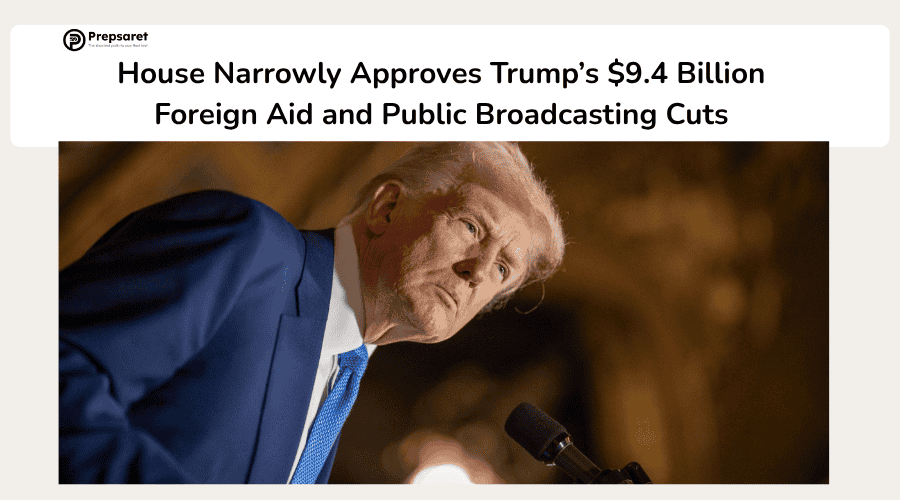Summary:
- The U.S. House passed a $9.4 billion rescission package, targeting foreign aid and funding for NPR and PBS.
- President Trump and GOP leaders hailed the vote as a victory for fiscal discipline, while critics warn of harm to global health and public media.
- The measure now heads to the Senate, where its fate remains uncertain amid bipartisan concerns.
In a closely contested vote on Thursday, the U.S. House of Representatives approved President Donald Trump’s proposal to eliminate $9.4 billion in previously authorized spending, primarily targeting foreign aid programs and public broadcasting. The bill passed by a razor-thin margin of 214 to 212, with four Republicans joining all Democrats in opposition.
This legislative package, known as a “rescissions” bill, is aimed at codifying spending cuts initiated by the White House’s Department of Government Efficiency (DOGE), led by tech mogul Elon Musk. If passed by the Senate, the measure would permanently cancel funds for programs including USAID, NPR, PBS, and global health efforts like PEPFAR—the Bush-era initiative to combat HIV/AIDS globally.
Trump and GOP Leaders Frame Bill as Fiscal Reform
The passage of the bill marked a significant win for Trump, who personally lobbied lawmakers and called the vote a “no-brainer” on his Truth Social platform. House Speaker Mike Johnson, R-La., echoed that sentiment, describing the package as a “manifestation of the DOGE effort” and a “first step toward restoring fiscal accountability.”
“There is no reason for any media organization to be singled out to receive federal funds,” Johnson said, referring to NPR and PBS, which he accused of spreading “radical, woke propaganda disguised as news.”
The package includes $1.1 billion in cuts to the Corporation for Public Broadcasting and $8.3 billion from foreign aid, including peacekeeping efforts, refugee support, and climate projects. Johnson also targeted USAID, alleging it had “put scrutiny targets on their own backs” by resisting accountability reviews.
Opposition Warns of Impact on Health, Security, and Local Communities
Democratic lawmakers and some moderate Republicans voiced strong objections. Programs like PEPFAR, credited with saving over 26 million lives, were among the most contentious cuts. Republican Senator Susan Collins said, “PEPFAR cuts make no sense to me whatsoever, given the extraordinary record of saving lives.”
Sen. Lisa Murkowski, R-Alaska, warned that cutting PBS would devastate public safety in rural areas. “For many Alaskan communities, PBS is the only means of receiving life-saving alerts during power outages and natural disasters,” she said.
House Minority Leader Hakeem Jeffries, D-N.Y., condemned the package as “reckless,” accusing Republicans of endangering national security and foreign relations to appease partisan agendas.
Senate Approval Remains Uncertain
The rescission bill now heads to the Senate, where it faces a tougher path. Although not subject to a 60-vote threshold, several GOP senators have already signaled discomfort with the proposed cuts. The Senate has until July 18 to act before the measure expires.
Despite the narrow House win, the future of the bill remains in flux. Lawmakers from both parties are expected to negotiate revisions in the coming weeks, particularly around global health and public media funding.
Other Top Headlines:

